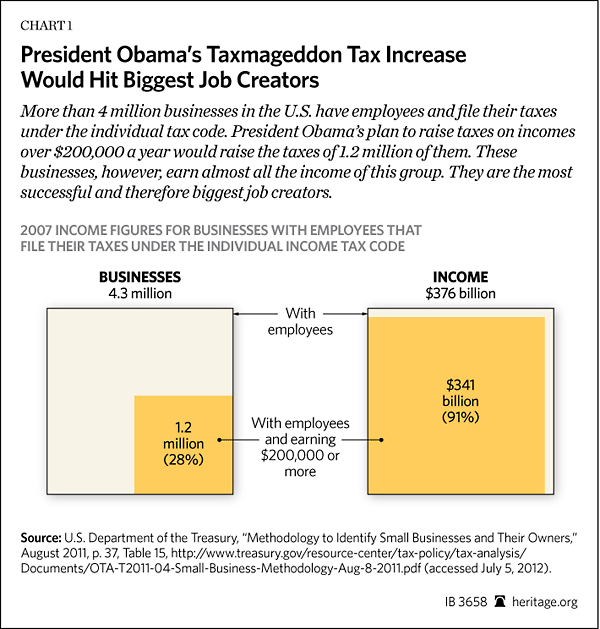Pressure is building on President Obama and Congress to stop Taxmageddon, a $494 billion one-year tax increase that is poised to strike the economy on January 1, 2013.[1] After a considerable period of silence, President Obama finally entered the debate about Taxmageddon in a recent speech.
Rather than come out in favor of stopping Taxmageddon in its entirety, however, President Obama instead pushed for his long-sought tax increase plan to repeal the Bush tax cuts (the largest portion of Taxmageddon) for “the rich.”[2] This misguided plan would hurt Americans at all income levels because it would slow job creation.
Hitting Almost All Income Earned by Job Creators
President Obama’s plan to repeal the Bush tax cuts for incomes over $200,000 ($250,000 for joint filers) would, along with other tax increases, raise the top two marginal tax rates from 35 percent and 33 percent to 39.6 percent and 36 percent, respectively. The debate about whether to adopt the President’s tax increase centers heavily on how these higher tax rates would affect important job-creating businesses that pay their taxes through the individual income tax, known as flow-through businesses.
There is considerable debate about whether flow-through businesses that pay the higher rates are job creators.[3] A report from President Obama’s own Treasury Department provides data that settle the point conclusively.[4] The report parcels out the flow-through business income earned by traditional businesses that employ workers from the income earned by individuals earning business income from side jobs. Such broken-out data did not exist previously.
The distinction the Treasury report makes is important because the individuals that do side jobs report what they earn from their endeavors as business income. They also make up the vast majority of filers with flow-through business income. However, they rarely hire workers.
A few examples of individuals earning side income but not acting in the manner of a traditional business include issue experts writing articles for publications, academics conducting studies or giving lectures, computer technicians repairing computers and other electronic devices, hobbyists selling the products they make, and people selling items on e-Bay.
According to the Treasury study, out of 34.8 million tax returns that claimed flow-through business income, 4.3 million employed workers in 2007 (the most recent year for which data are available). The more than 30 million returns with business income (88 percent of the total returns with business income) that did not qualify as employer-businesses are those individuals earning business income from side jobs.
It is those 4.3 million employer-businesses that matter most when it comes to determining the impact that President Obama’s tax increase would have on job creation. The Treasury report shows that 1.2 million, or 28 percent, of them earned more than $200,000—the income threshold over which President Obama’s tax increase would apply. More important as it pertains to job creation, those 28 percent of businesses earned almost all—91 percent—of the income earned by flow-through employer-businesses.

Obama Tax Increase Would Hit Largest Job Creators
The businesses that earn almost all of the income are the most successful flow-through employer-businesses. That also means they are the businesses that create the most jobs.
Successful businesses are the businesses with the most demand for the goods and services they make and provide. This high demand generates the high incomes that typify successful businesses. To meet that high demand, these businesses need more workers.
By pinpointing his tax increase on incomes over $200,000, President Obama has maximized the detrimental impact that his tax increase would have on job creation. A higher tax bill would deprive the most successful flow-through employer-businesses of resources they would otherwise plow back into their business. These investments would allow them to compete for more business and create more jobs in the process.
Higher marginal tax rates would also reduce the incentive for these important job creators to expand and take on risk with their remaining resources, because the higher rates would reduce the return that the owners of the businesses could expect to earn from their investment. This would further deter job creation.
Stop All of Taxmageddon
President Obama often states that his plan would raise taxes only on “the rich” to force them to pay their “fair share.” But less job creation as a result of President Obama’s tax increase would make it harder for unemployed Americans at all income levels to find new jobs, and those seeking new opportunities to fully realize their potential would find it harder to find more rewarding positions. Most Americans would find those diminished opportunities anything but fair.
Congress should stop all of Taxmageddon as soon as possible. That means extending the Bush tax cuts for all taxpayers. Stopping a tax increase that would devastate job creation should be a rare occasion for bipartisan agreement and would be a useful way for Washington to prove to voters that it is focused on job creation at a time when almost 12.7 million Americans remain out of work.
Curtis S. Dubay is a Senior Analyst in Tax Policy in the Thomas A. Roe Institute for Economic Policy Studies at The Heritage Foundation.


